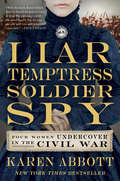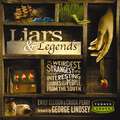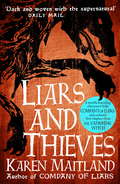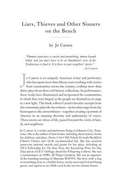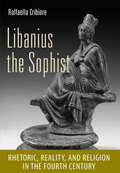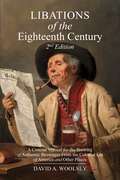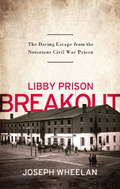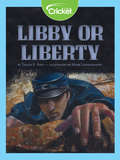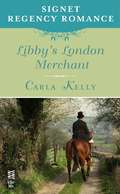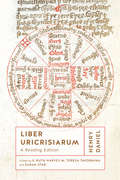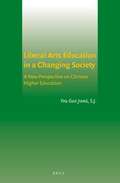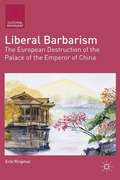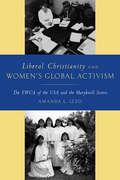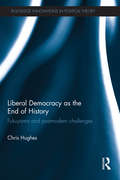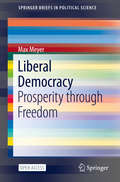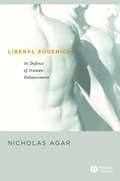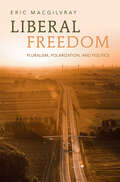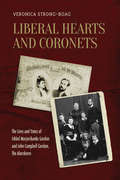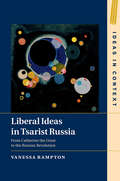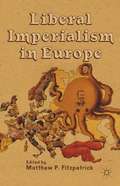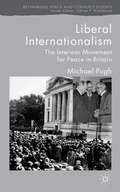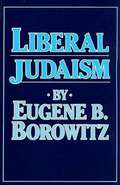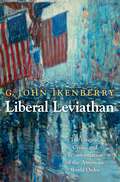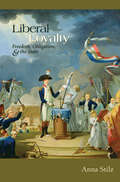- Table View
- List View
Liar, Temptress, Soldier, Spy: Four Women Undercover in the Civil War
by Karen AbbottKaren Abbott, the New York Times bestselling author of Sin in the Second City and “pioneer of sizzle history” (USA Today), tells the spellbinding true story of four women who risked everything to become spies during the Civil War.Karen Abbott illuminates one of the most fascinating yet little known aspects of the Civil War: the stories of four courageous women—a socialite, a farmgirl, an abolitionist, and a widow—who were spies.After shooting a Union soldier in her front hall with a pocket pistol, Belle Boyd became a courier and spy for the Confederate army, using her charms to seduce men on both sides. Emma Edmonds cut off her hair and assumed the identity of a man to enlist as a Union private, witnessing the bloodiest battles of the Civil War. The beautiful widow, Rose O’Neale Greenhow, engaged in affairs with powerful Northern politicians to gather intelligence for the Confederacy, and used her young daughter to send information to Southern generals. Elizabeth Van Lew, a wealthy Richmond abolitionist, hid behind her proper Southern manners as she orchestrated a far-reaching espionage ring, right under the noses of suspicious rebel detectives.Using a wealth of primary source material and interviews with the spies’ descendants, Abbott seamlessly weaves the adventures of these four heroines throughout the tumultuous years of the war. With a cast of real-life characters including Walt Whitman, Nathaniel Hawthorne, General Stonewall Jackson, detective Allan Pinkerton, Abraham and Mary Todd Lincoln, and Emperor Napoleon III, Liar, Temptress, Soldier, Spy draws you into the war as these daring women lived it.Liar, Temptress, Soldier, Spy contains 39 black & photos and 3 maps.
Liars & Legends: The Weirdest, Strangest, and Most Interesting Stories from the South
by Emily EllisonEveryone loves a good story. And Liars and Legends contains 40 of the South's most interesting and . . . well . . . just plain curious stories. This book grows out of the popular Turner South television show, Liars and Legends and will be promoted on the show.
Liars and Thieves (A Company of Liars short story): An exclusive e-novella accompaniment to Company of Liars
by Karen MaitlandLiars and Thieves is an exclusive e-novella featuring characters from Karen Maitland's much-loved Company of Liars, set against the backdrop of the plague outbreak of 1348. Sure to enthral fans of Minette Walters' The Last Hours and Kate Mosse's The Burning Chambers. 'Combines the storytelling traditions of The Canterbury Tales with the supernatural suspense of Mosse's Sepulchre in this atmospheric tale of treachery and magic' Marie Claire on Company of LiarsCamelot and Narigorm the rune reader return to delight fans of Karen Maitland's classic novel as the company - in their desperate bid to outrun the plague - encounter a band of outlaws, who are making the most of the breakdown in law and order to steal from the weak ... and kill at leisure.But in the child Narigorm they might just have met their match - for plague is the lesser of those two evils.What readers are saying about Liars and Thieves: 'If you read Company of Liars, you'll love this. A wonderful short story''A short but excellent read from this consistently reliable author''An interesting gap filler. Atmospheric, dark, occasionally gruesome and mildly creepy. A nice reminder of the original characters and storyline'
Liars and Thieves (A Company of Liars short story): An exclusive e-novella accompaniment to Company of Liars
by Karen MaitlandLiars and Thieves is an exclusive novella featuring characters from Karen Maitland's much-loved Company of Liars, set against the backdrop of the plague outbreak of 1348. Also included are the opening chapters from The Vanishing Witch, Karen's thrilling new novel, which is published in August. 'Combines the storytelling traditions of The Canterbury Tales with the supernatural suspense of Mosse's Sepulchre in this atmospheric tale of treachery and magic' Marie Claire on Company of Liars Camelot and Narigorm the rune reader return to delight fans of Karen Maitland's classic novel as the company - in their desperate bid to outrun the plague - encounter a band of outlaws, who are making the most of the breakdown in law and order to steal from the weak ... and kill at leisure. But in the child Narigorm they might just have met their match - for plague is the lesser of those two evils.
Liars, Thieves and Other Sinners on the Bench
by Jo Carson"Haunting and funny, full of folk wisdom and unfl inching honesty."--Publishers Weekly, on the work of Jo Carson"She is a quintessential community artist with a true ear for the way people talk and what they really mean to say. Her work has inspired innumerable young artists to take up work with their own communities."--Linda Frye Burnham, Community Arts Network"Human experience is varied and astonishing," notes Jo Carson, "and this is a taste." A uniquely American writer and performer, Carson has spent fifteen years working with peoples' stories in communities across the country, crafting more than thirty plays from the oral histories she has collected. In performance, these works have illuminated and invigorated the communities in which they were forged, as the people see themselves onstage in a new light. This book collects Carson's favorite excerpts from the plays--stories that range from the homespun to the extraordinary and together create a portrait of America in an amazing diversity and authenticity of voices. They are slices of life, passed beyond the circle of family and neighbors.Jo Carson is a writer and performer living in John City, Tennessee. She has published award-winning plays, short stories, children's books, essays, poems, and other work, and for years was a commentator on National Public Radio's All Things Considered. Her play Whispering to Horses and solo show If God Came Down . . . premiered at Seven Stages Theatre in Atlanta, and her book of monologues and dialogues, Stories I Ain't Told Nobody Yet, made Booklist's editor's choice and the American Library Association's recommended list.
Libanius the Sophist: Rhetoric, Reality, and Religion in the Fourth Century
by Raffaella CribioreLibanius of Antioch was a rhetorician of rare skill and eloquence. So renowned was he in the fourth century that his school of rhetoric in Roman Syria became among the most prestigious in the Eastern Empire. In this book, Raffaella Cribiore draws on her unique knowledge of the entire body of Libanius’s vast literary output—including 64 orations, 1,544 letters, and exercises for his students—to offer the fullest intellectual portrait yet of this remarkable figure whom John Chrystostom called “the sophist of the city."Libanius (314–ca. 393) lived at a time when Christianity was celebrating its triumph but paganism tried to resist. Although himself a pagan, Libanius cultivated friendships within Antioch’s Christian community and taught leaders of the Church including Chrysostom and Basil of Caesarea. Cribiore calls him a “gray pagan” who did not share the fanaticism of the Emperor Julian. Cribiore considers the role that a major intellectual of Libanius’s caliber played in this religiously diverse society and culture. When he wrote a letter or delivered an oration, who was he addressing and what did he hope to accomplish? One thing that stands out in Libanius’s speeches is the startling amount of invective against his enemies. How common was character assassination of this sort? What was the subtext to these speeches and how would they have been received? Adapted from the Townsend Lectures that Cribiore delivered at Cornell University in 2010, this book brilliantly restores Libanius to his rightful place in the rich and culturally complex world of Late Antiquity.
Libations of the Eighteenth Century: A Concise Manual for the Brewing of Authentic Beverages from the Colonial Era of America and Other Places (2nd Edition)
by David A. WoolseyThis manual works equally well for the novice brewer, the advanced brewer, and food historians or Living History enthusiasts. Having an emphasis on Colonial America, within may be found more than fifty recipes for beer and ale as well as mead and hard ci
Libby Prison Breakout: The Daring Escape from the Notorious Civil War Prison
by Joseph WheelanWhile many books have been inspired by the horrors of Andersonville prison, none have chronicled with any depth or detail the amazing tunnel escape from Libby Prison in Richmond. Now Joseph Wheelan examines what became the most important escape of the Civil War from a Confederate prison, one that ultimately increased the North’s and South’s willingness to use prisoners in waging "total war. ” In a converted tobacco warehouse, Libby’s 1,200 Union officers survived on cornbread and bug-infested soup, and slept without blankets on the bare floor. With prisoner exchanges suspended, escape and death were the only ways out. Libby Prison Breakout recounts the largely unknown story of the escape of 109 steel-nerved officers through a 55-foot tunnel, and their flight in winter through the heart of the enemy homeland, amid an all-out Rebel manhunt. The officers’ later testimony in Washington spurred two far-reaching investigations and a new cycle of retaliation against Rebel captives.
Libby or Liberty
by Tracey E. FernUnion Colonel Thomas E. Rose was captured in a Civil War battle and thrown in the brutal and secure Libby Prison. He quickly realizes that tunneling out is the only way to escape and joins forces with Major A. G. Hamilton to begin digging to freedom.
Libby's London Merchant: Signet Regency Romance (InterMix) (A Benedict Nesbitt Novel)
by Carla KellyLibby’s London MerchantMiss Elizabeth Ames knew nothing about Mr. Nesbitt Duke -save that he was a London merchant who stopped by her country manor after an accident on the road. Soon she realized that he was more than he seemed -and that he had stolen her heart…Miss Chartley’s Guided TourAfter being abandoned at the altar, Omega Chartley swore she would never love again, and found employment of her own -though far below her station. Then fate brought her ex-fiance Matthew Bering back into her life. And although she has every reason to reject his entreaties, she finds herself once more under his spell…
Liber Uricrisiarum: A Reading Edition
by Henry DanielHenry Daniel’s Liber Uricrisiarum is the earliest known work of academic medicine written in Middle English, presented here for the first time in a complete edition. Working in the late 1370s, Daniel combined authoritative medicine from written sources with his own personal experience, creating a text that stands out for its linguistic originality, intellectual scope, and wide circulation. Extant in over three dozen manuscript witnesses and two early modern print copies, Liber Uricrisiarum describes medieval humoral theory, anatomy, physiology, disease, medical astronomy, reproductive processes, and more, all within the broader context of uroscopic diagnosis. The introduction situates the text and its author in their medical, intellectual, linguistic, and bibliographic contexts, outlining the uroscopic tradition to which Daniel contributes, and describing the relationships among the many manuscripts containing the Liber Uricrisiarum. This edition presents the Middle English text, with a general glossary, glossary of proper names, and explanatory notes that explain obscure words and phrases and identify Daniel’s sources. It also includes the complete set of diagrams contained in the Royal manuscript; appendices providing the Latin and English versions of the prologue and epilogue; an extensive translation from one of Daniel’s important sources, Isaac Israeli’s De urinis; tables relevant to Daniel’s astronomical measurements; and an analysis of the Royal manuscript’s dialect. Cumulatively, the edition and apparatus introduce readers to an important yet understudied text, the details of which will have significant impact on studies of medieval medicine and science, intellectual history, and Middle English language and literature.
Liberal Arts Education In A Changing Society: A New Perspective On Chinese Higher Education
by You Guo JiangIn Liberal Arts Education in a Changing Society: A New Perspective on Chinese Higher Education You Guo Jiang provides a unique focus on the re-emergence of liberal arts education in China.
Liberal Barbarism
by Erik RingmarIn Liberal Barbarism, Erik Ringmar sets out to explain the 1860 destruction of Yuanmingyuan - the Chinese imperial palace north-west of Beijing - at the hands of British and French armies. Yuanmingyuan was the emperor's own theme-park, a perfect world, a vision of paradise, which housed one of the greatest collections of works of art ever assembled. The intellectual puzzle which the book addresses concerns why the Europeans, bent on "civilizing" the Chinese, engaged in this act of barbarism. The answer is provided through an analysis of the performative aspect of the confrontation between Europe and China, focusing on the differences in the way their respective international systems were conceptualized. Ringmar reveals that the destruction of Yuanmingyuan represented the Europeans' campaign to "shock and awe" the Chinese, thereby forcing them to give up their way of organizing international relations. The contradictions which the events of 1860 exemplify - the contradiction between civilization and barbarism - is a theme running through all European (and North American) relations with the rest of the world since, including, most recently, the US war in Iraq.
Liberal Christianity and Women's Global Activism: The YWCA of the USA and the Maryknoll Sisters
by Amanda IzzoReligiously influenced social movements tend to be characterized as products of the conservative turn in Protestant and Catholic life in the latter part of the twentieth century, with women's mobilizations centering on defense of the “traditional” family. In Liberal Christianity and Women’s Global Activism, Amanda L. Izzo argues that, contrary to this view, liberal wings of Christian churches have remained an instrumental presence in U.S. and transnational politics. Women have been at the forefront of such efforts. Focusing on the histories of two highly influential groups, the Young Women’s Christian Association of the USA, an interdenominational Protestant organization, and the Maryknoll Sisters, a Roman Catholic religious order, Izzo offers new perspectives on the contributions of these women to transnational social movements, women’s history, and religious studies, as she traces the connections between turn-of-the-century Christian women’s reform culture and liberal and left-wing religious social movements of the 1960s and 1970s. Izzo suggests that shared ethical, theological, and institutional underpinnings can transcend denominational divides, and that strategies for social change often associated with secular feminism have ties to spiritually inspired social movements.
Liberal Democracy as the End of History: Fukuyama and Postmodern Challenges (Routledge Innovations in Political Theory)
by Christopher HughesFrancis Fukuyama claims that liberal democracy is the end of history. This book provides a theoretical re-examination of this claim through postmodernist ideas. The book argues that postmodern ideas provide a valuable critique to Fukuyama’s thesis, and poses the questions: can we talk about a universal and teleological history; a universal human nature; or an autonomous individual? It addresses whether postmodern theories - concerning the movement of time, what it means to be human, and what it means to be an individual/subject - can be accommodated within a theory of a history that ends in liberal democracy. The author argues that incorporating elements of postmodern thought into Fukuyama’s theory makes it possible to produce a stronger and more compelling account of the theory that liberal democracy is the end of history. The result of this is to underpin Fukuyama’s theory with a more complex understanding of the movement of time, the human and the individual, and to show that postmodern concepts can, paradoxically, be used to strengthen Fukuyama’s theory that the end of history is liberal democracy. The book will be of interest to students and scholars of political theory, postmodernism and the work of Francis Fukuyama.
Liberal Democracy: Prosperity through Freedom (SpringerBriefs in Political Science)
by Max MeyerThis open access book aims to show which factors have been decisive in the rise of successful countries. Never before have so many people been so well off. However, prosperity is not a law of nature; it has to be worked for. A liberal economy stands at the forefront of this success – not as a political system, but as a set of economic rules promoting competition, which in turn leads to innovation, research and enormous productivity. Sustainable prosperity is built on a foundation of freedom, equal opportunity and a functioning government. This requires a stable democracy that cannot be defeated by an autocrat. Autocrats claim that “illiberalism” is more efficient, an assertion that justifies their own power. Although autocrats can efficiently guide the first steps out of poverty, once a certain level of prosperity has been achieved, people begin to demand a sense of well-being – freedom and codetermination. Only when this is possible will they feel comfortable, and progress will continue. Respect for human rights is crucial.The rules of the free market do not lean to either the right or left politically. Liberalism and the welfare state are not mutually exclusive. The “conflict” concerns the amount of government intervention. Should there be more or less?As a lawyer, entrepreneur, and board member with over 40 years of experience in this field of conflict, the author clearly describes the conditions necessary for a country to maintain its position at the top.
Liberal Eugenics: In Defence of Human Enhancement
by Nicholas AgarPublic debate about the use of genetic technology is dominated by fears of a Huxleyan 'Brave New World' or a return to the fascist eugenics of the past. In this controversial book, philosopher Nicholas Agar defuses these anxieties and defends the idea that parents should be allowed to enhance their children's genetic characteristics. Agar describes three technologies that may soon make liberal eugenics a practical possibility - cloning by somatic cell nuclear transfer, genomics, and genetic engineering - and argues that parents can use these technologies to realize their procreative goals without harming the people they will bring into existence. He rejects the idea that eugenics need divide society into genetic haves and have-nots, and denies that social pressures need force eugenic choices to converge on a single view of human excellence, suggesting that these threats to liberal social arrangements can be resisted.
Liberal Freedom: Pluralism, Polarization, and Politics
by Eric MacGilvrayWe seem to be losing the ability to talk to each other about – and despite – our political differences. The liberal tradition, with its emphasis on open-mindedness, toleration, and inclusion, is ideally suited to respond to this challenge. Yet liberalism is often seen today as a barrier to constructive dialogue: narrowly focused on individual rights, indifferent to the communal sources of human well-being, and deeply implicated in structures of economic and social domination. This book provides a novel defense of liberalism that weaves together a commitment to republican self-government, an emphasis on the value of unregulated choice, and an appreciation of how hard it is to strike a balance between them. By treating freedom rather than justice as the central liberal value this important book, critical to the times, provides an indispensable resource for constructive dialogue in a time of political polarization.
Liberal Hearts and Coronets
by Veronica Strong-BoagScottish aristocrats John Campbell Gordon (1847-1934) and Ishbel Marjoribanks Gordon (1857-1939), known as the Aberdeens, rejected both revolution and reaction in their political careers. The aristocratic progressivism and egalitarian marriage of these fervent liberals confounded both contemporaries and historians. John, as viceroy of Ireland and governor-general of Canada, was a notable ally of feminists, workers, and Irish Home Rulers. Ishbel, his viceregal companion and the long-time president of the International Council of Women, was a liberal feminist and Home Ruler whose commitments stirred up even more controversy.Superbly written and informed by decades of research, Liberal Hearts and Coronets is the first biography to treat John Campbell Gordon as seriously as his better-known wife. Examining the Aberdeens' remarkable careers as landlords, philanthropists, and international progressives, Veronica Strong-Boag casts the twilight of the British aristocracy in an entirely new light.
Liberal Ideas in Tsarist Russia: From Catherine the Great to the Russian Revolution (Ideas in Context #126)
by Vanessa RamptonLiberalism is a critically important topic in the contemporary world as liberal values and institutions are in retreat in countries where they seemed relatively secure. Lucidly written and accessible, this book offers an important yet neglected Russian aspect to the history of political liberalism. Vanessa Rampton examines Russian engagement with liberal ideas during Russia's long nineteenth century, focusing on the high point of Russian liberalism from 1900 to 1914. It was then that a self-consciously liberal movement took shape, followed by the founding of the country's first liberal (Constitutional-Democratic or Kadet) party in 1905. For a brief, revelatory period, some Russians - an eclectic group of academics, politicians and public figures - drew on liberal ideas of Western origin to articulate a distinctively Russian liberal philosophy, shape their country's political landscape, and were themselves partly responsible for the tragic experience of 1905.
Liberal Imperialism in Europe
by Matthew P. FitzpatrickIn this state-of-the-field anthology, leading scholars in the fields of European imperial history and intellectual history explore the nature of European imperialism during the 'long nineteenth century', scrutinizing the exact relationship between the various forms of liberalism in Europe and the various imperial projects of Europe.
Liberal Internationalism: The Interwar Movement for Peace in Britain (Rethinking Peace and Conflict Studies)
by Michael C. PughThe book investigates the role of popular liberal internationalism as a social movement in Britain using Gramscian and Foucauldian ideas of civil society. It addresses the use of force for peace through an examination of the impact of civil society actors in popular liberal internationalism between the world wars.
Liberal Judaism
by Eugene B. BorowitzAn acute and precise insight into history of the Jewish people from an early Semitic tribe to its place today as a force in America and throughout the world.
Liberal Leviathan: The Origins, Crisis, and Transformation of the American World Order (Princeton Studies in International History and Politics #141)
by G. John IkenberryA new vision for the American world orderIn the second half of the twentieth century, the United States engaged in the most ambitious and far-reaching liberal order building the world had yet seen. This liberal international order has been one of the most successful in history in providing security and prosperity to more people. But in the last decade, the American-led order has been troubled. Some argue that the Bush administration, with its war on terror, invasion of Iraq, and unilateral orientation, undermined this liberal order. Others argue that we are witnessing the end of the American era. Liberal Leviathan engages these debates.G. John Ikenberry argues that the crisis that besets the American-led order is a crisis of authority. A political struggle has been ignited over the distribution of roles, rights, and authority within the liberal international order. But the deeper logic of liberal order remains alive and well. The forces that have triggered this crisis—the rise of non-Western states such as China, contested norms of sovereignty, and the deepening of economic and security interdependence—have resulted from the successful functioning and expansion of the postwar liberal order, not its breakdown. The liberal international order has encountered crises in the past and evolved as a result. It will do so again.Ikenberry provides the most systematic statement yet about the theory and practice of the liberal international order, and a forceful message for policymakers, scholars, and general readers about why America must renegotiate its relationship with the rest of the world and pursue a more enlightened strategy—that of the liberal leviathan.
Liberal Loyalty: Freedom, Obligation, and the State
by Anna StilzMany political theorists today deny that citizenship can be defended on liberal grounds alone. Cosmopolitans claim that loyalty to a particular state is incompatible with universal liberal principles, which hold that we have equal duties of justice to persons everywhere, while nationalist theorists justify civic obligations only by reaching beyond liberal principles and invoking the importance of national culture. In Liberal Loyalty, Anna Stilz challenges both views by defending a distinctively liberal understanding of citizenship. Drawing on Kant, Rousseau, and Habermas, Stilz argues that we owe civic obligations to the state if it is sufficiently just, and that constitutionally enshrined principles of justice in themselves--rather than territory, common language, or shared culture--are grounds for obedience to our particular state and for democratic solidarity with our fellow citizens. She demonstrates that specifying what freedom and equality mean among a particular people requires their democratic participation together as a group. Justice, therefore, depends on the authority of the democratic state because there is no way equal freedom can be defined or guaranteed without it. Yet, as Stilz shows, this does not mean that each of us should entertain some vague loyalty to democracy in general. Citizens are politically obligated to their own state and to each other, because within their particular democracy they define and ultimately guarantee their own civil rights. Liberal Loyalty is a persuasive defense of citizenship on purely liberal grounds.
